10 women that are choosing to challenge gender inequality and bias
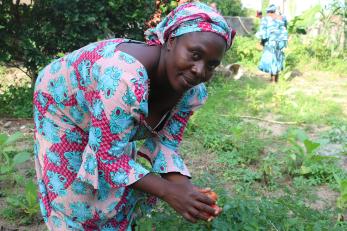
Since 1911, on March 8, International Women’s Day is commemorated around the globe to celebrate the social, economic, cultural, and political achievements of women. It also serves as a call to action for women’s equality.
Mercy Corps Nigeria works with women and adolescent girls in the communities we serve to help them develop the skills, access the resources and build relationships they need to be productive and empowered members of the society.
In line with this year’s theme for International Women’s Day, we choose to challenge and call out all gender biases, and challenges facing women, especially worsened by the COVID‑19 pandemic. We have also chosen to celebrate the achievements of these women who have shown courage in the way they have supported other women in their communities/networks and our team members who are inspiring for their work in gender inclusion and women empowerment.
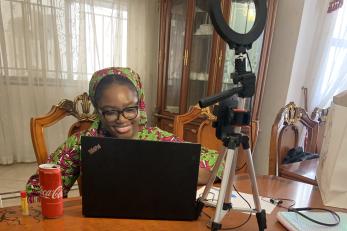
The peacebuilding expert: Rahama, program manager at Mercy Corps
Rahama Baloni is the Program Manager for Community Initiatives to Promote Peace (CIPP), Mercy Corps Nigeria. She has worked on peacebuilding programs to address farmer herder conflict in Nigeria's Middle Belt and interreligious conflicts and violent extremism in parts of the Northwest.
“In 2019, my work on the Engaging Communities for Peace in Nigeria program contributed to a 13% reduction in farmer-herder violence in Benue and Nasarawa states. I oversaw the resolution of 1,932 communal disputes and engaged over 1,449 women in substantive roles for peacebuilding programming in their communities.”
Within the first year of the USAID funded CIPP program, in her current role, she contributed to the resolution of an additional 125 disputes, engaged 1,025 women in substantive roles for peacebuilding and trained 123 religious leaders to reduce the appeal of violent extremism.
“I #ChooseToChallenge the limiting stereotypes of women in the workplace by demonstrating my ability to deliver high level impact programs that are bringing change to communities and individuals that need it most,” says Rahama on her motivation to work in peacebuilding.
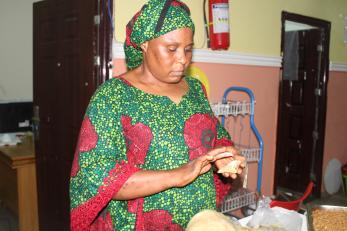
Empowering women with baking and cooking skills: Ladi, owner of bakery and restaurant
Ladi Musa Dibal is the owner of LM Bakery and Restaurant, a popular eatery in Maiduguri. She is also the learning facilitator who teaches baking and pastry classes to participants under the Mercy Corps Nigeria Borno Maida Early Recovery Program.
Giving back has always been a priority to Ladi, from helping families in need to coaching and training women in her community, despite the protracted insecurity in Borno state. “During the COVID‑19 lockdown, I am glad I was able to coordinate my workers to distribute food and resources to families in my community.”
When the lockdown eased up, she continued with her training for young participants, teaching them a variety of pastry and cooking skills, even beyond the curriculum agreed upon by her establishment and Mercy Corps. Many of the participants who have completed the training with her have gone on to start their own pastry businesses in their communities, some she supported with capital from her business.
“I want to leave a legacy, because no one knows tomorrow. I am not going to die with this knowledge so I will continue to share this knowledge with anybody that comes my way. Everybody has their own market, when you give knowledge they are not stealing your market. It is my wish to see all my students bigger than me one day,” says Ladi, on her motivation for coaching young people.
Ladi started her baking business over 27 years ago by selling to people in her community. With determination and doggedness, she continued growing her business by saving and now has two branches in Borno state.
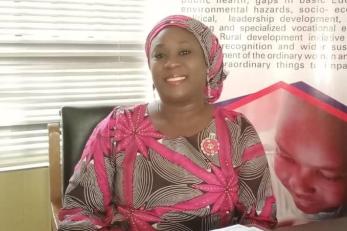
The mother hen of women and orphans in Gombe: Dr. Erisa, farmer and executive director
Dr. Erisa Danladi is a farmer and the executive director of Motherhen Development Foundation, that focuses on health and economic growth in Gombe state. She is a mother of many with a large accommodating heart.
When the pandemic struck, the movement restrictions prevented her and her peers from farming, forcing her to find a way to cope with this shock, “I had to rely on stored produce for my previous harvest for my family. However, I was still able to lend a helping hand by sharing some of my stored grains to other women who work with me on the farms.”
During an extension service workshop organized by the Mercy Corps’ Rural Resilience Activity, the Motherhen Foundation, she was able to pitch her foundation’s capacity to grow breeder seeds and request for additional technical support in seed multiplication to representatives of the National Seed Council of Nigeria and other research institutes.e National Seed Council of Nigeria were impressed and have since then provided the needed technical support in the form of research and consultancy to the Motherhen Development Foundation. “We are ready for the wet season and we have Mercy Corps to thank for this confidence, for bringing the expertise we have always needed to enable women and youth in our community realize their dreams of becoming seed breeders in Gombe State.”
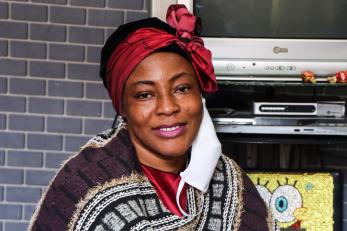
The “trouble maker” who gets things done: Bariat, entrepreneur
Bariat Silas is a small business owner and a participant of Mercy Corps’ Community Initiatives to Promote Peace (CIPP) program Women Critical Discussion Group (WCDG). From participating in the WCDG, she has learned a lot with the most significant lesson being that rape is nothing to be ashamed of, to this end, she was able to stand up for the right of a sexually abused minor in her community to the point of prosecution. “So there was an incident where a 13-year-old girl was raped by five teenagers. Her mum did not want to report, thinking it was a thing of shame. I encouraged her to seek justice and gave her my full support. We reported to the police and state Ministry of Women Affairs to ensure she gets justice.”
Bariat is known by male leaders in her community as a “troublemaker” because of her dogged approach to fighting for change in her community. Among other things, she hopes to kick off a reusable sanitary towel project for women in her community, as a safe and sustainable solution to periods.
“Thanks to CIPP, I am more emboldened to speak up in spaces where I couldn't before. Whenever I walk up to my district head people will see me and say ‘this woman has come again’ but they always listen to what I have to say. I might have developed a reputation for being ‘troublesome’ but it allows me to exercise my rights and speak up for myself and other women in the community.”
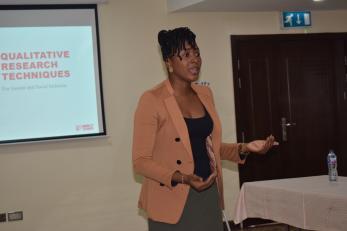
Using data to transform young women’s lives: Sheilla, MEL advisor at Mercy Corps
Sheilla Uzor Onasanya is a Monitoring Evaluation and Learning (MEL) Advisor at Mercy Corps Nigeria. Her professional career in the last 10 years has been dedicated to working in the development and humanitarian sector to serve marginalized populations.
At Mercy Corps she has led the implementation of MEL systems to harvest and track the impact of program interventions for 18,000+ young women across Nigeria.
“I love what I do because data is a voice and has the power to transform lives. I strive to discover the hidden stories in data to generate insights that inform innovative solutions for youths, women and children,” shares Sheilla on how she uses the power of data.
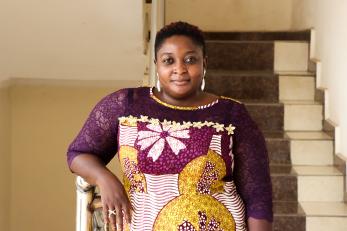
Building women to be peacebuilders: Mariagoretti, Women’s Peacebuilding coordinator at Mercy Corps
Mariagoretti Aya, fondly called Maria, is the Women’s Peacebuilding coordinator on the CIPP Program. She is also a lawyer.
In her current role, she works closely with hundreds of women in the 24 local government areas of the six implementing states of CIPP to improve their capacity to manage disputes and to prevent and resolve conflict. She is also responsible for helping to increase collaboration between women at the community level and government agencies, civil service organizations, and local leaders to address root causes of conflict and ensure women have a seat at the table during peace processes.
Maria shares highlights of her work with hundreds of women. “I’m very proud of the progress women have made in such a short time. I’m watching these women experience moments of awakening as they realize that they are capable of brokering and maintaining peace in their communities, that they have something to say and deserve to be heard. I am constantly receiving calls and messages from our women, sharing ideas on the ways they can engineer peace in their communities, and the activities they have spearheaded in their communities that have contributed to peace building.”
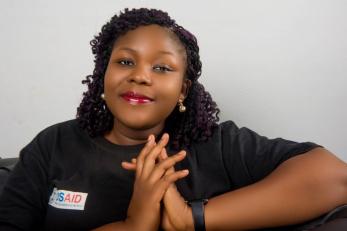
The budding SHEro: Cecilia, youth engagement officer at Mercy Corps
Cecilia Adamu is a Youth Engagement Officer on the Mercy Corps’ Rural Resilience Activity. She is a humanitarian and mother of two amazing girls who is passionate about women and girls living a dignified life, free from fear.
“Through the Feed the Future Nigeria Rural Resilience Activity, I joined the fight against Gender Based Violence (GBV). I educate, advocate and conduct referrals for victims of GBV. I believe it is only possible to end GBV in our communities if we work towards creating an enabling environment for women, girls, men and boys to thrive.”
Cecelia looks forward to becoming someone’s SHEro someday because she is brave and courageous enough to take action against GBV. She is not just a woman, but a voice in the community who believes a better world is possible and works towards it!
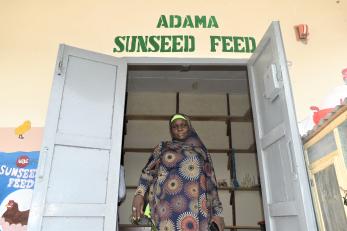
The savings champion and women’s leader: Adama, entrepreneur and VSLA coordinator
Adama Bukar was a pioneer member of a Village Savings and Loans Association (VSLA) group supported by Mercy Corps’ Poultry Development Resettlement program in Mairi community, Borno state. She spurred on several women in her community to join the VSLA group, as their leader and mentor.
Through her dedication and knowledge of the VSLA methodology, she has supported several women to start up their own VSLA groups, with over 30 groups under her supervision. She led her group to register as a cooperative with Borno state microfinance bank, where they secured a loan of 5 million naira that was distributed to several women in her community to start up businesses.
She is also a women leader, calling for increased women participation in local council politics and always seeking opportunities for women to start businesses of their own; a feat that has earned her the respect of some, and created animosity amongst some men who accused her of only supporting women. Despite this reaction, Adama says she will continue to remain dedicated in improving the lives of women in her community and in Nigeria as a whole.
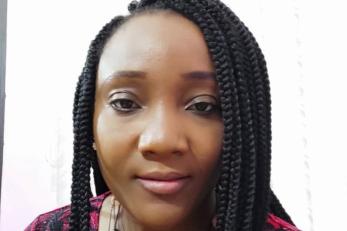
The woman ensuring compliance across programs: Adesola, ethics and assurance manager at Mercy Corps
Adesola Osuji is the Ethics and Assurance Manager at Mercy Corps Nigeria. Globally, this is an area typically dominated by men, with over 70% of persons in similar roles in Nigeria across other organizations being men.
In her role, she leads the ethics and assurance team and has the unique opportunity to ensure that compliance with Mercy Corps’ Code of Conduct policies and procedures; provide oversight on the safeguarding mandate of the organization and lead the investigations surrounding violations of the code of conduct in-country. She also manages all country level risks and drives the implementation of corrective measures to fill in identified gaps.
Adesola is proud of the work she uses in ensuring our programs are safer, “I am excited to see how our activities have been able to safeguard and empower the girl child, women, and indeed all vulnerable people. Owning to the fact we make sure that Mercy Corps' interventions and participants’ well beings are not jeopardized by fraud, corruption and other forms of safeguarding misconducts. This, for me, is one of the delights of being a woman in this field and in Mercy Corps.”
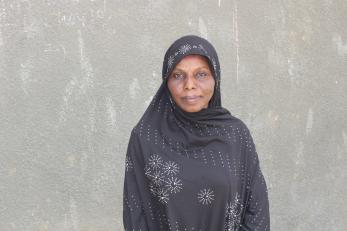
The community helper: Fanna, health educator and youth advocate
Fanna Mohammed is a member of a Youth Support Network created by the Mercy Corps Northeast Conflict Management and Stabilization (NE-CMS) program, where she leads initiatives to improve their livelihood opportunities and participation in development initiatives in their communities. She and other members teach women how to make liquid soap and detergent powder, as well as other skills that will make them independent and be able to care for themselves.
During the COVID‑19 lockdown, she and other women contributed money and resources which they used to buy food supplies to share to families that were adversely affected when the pandemic hit.
When Fanna noticed the misinformation and poor health hygiene in her community at the peak of the pandemic, she knew she had to do something. Putting her degree in health education from the University of Maiduguri to use, she is educating people in her community on the importance of maintaining the COVID‑19 safety guidelines. She believes that every woman should have a skill they can use to provide for themselves and hopes to become a lecturer in the future.